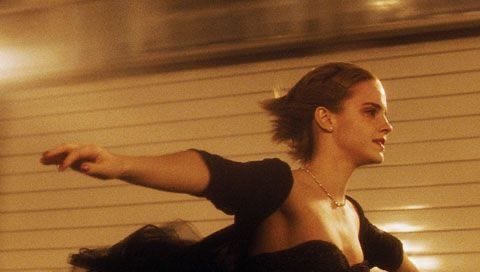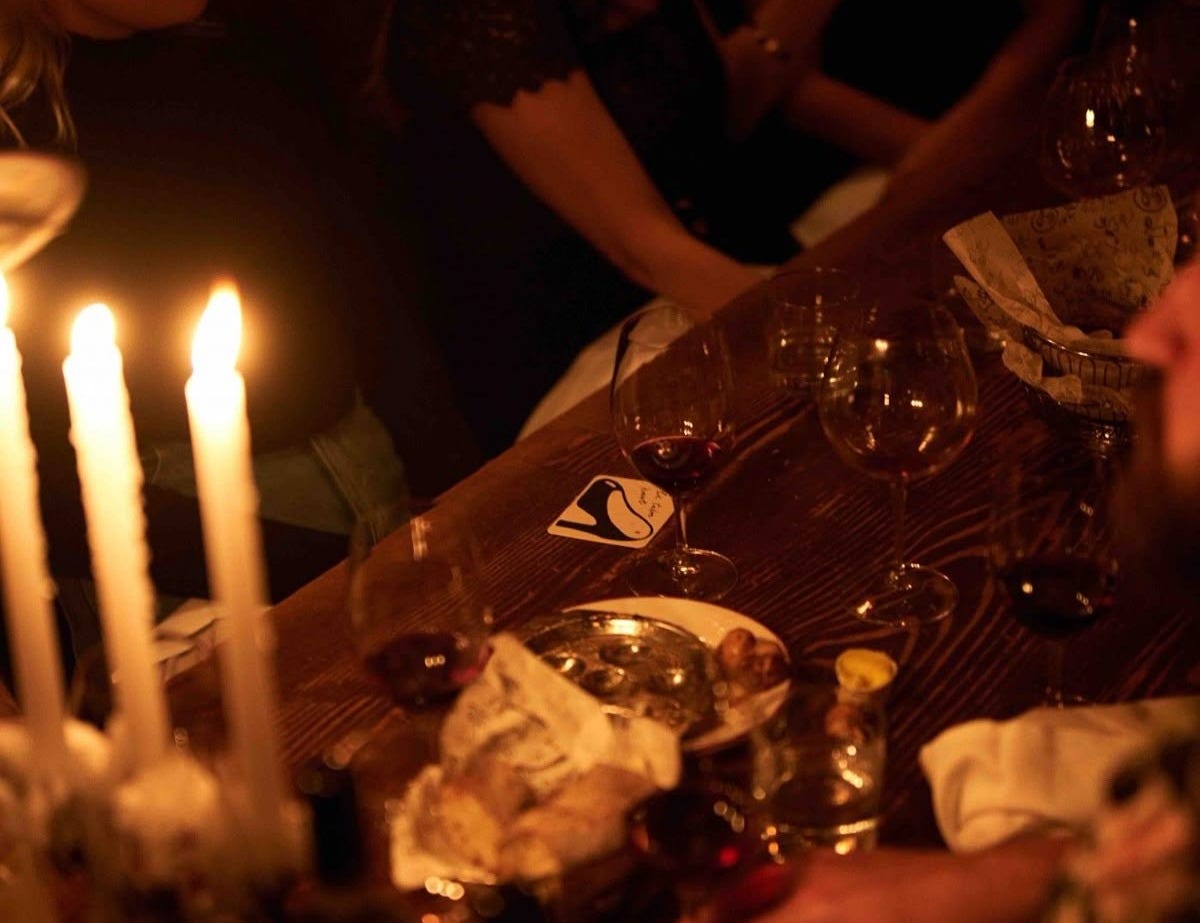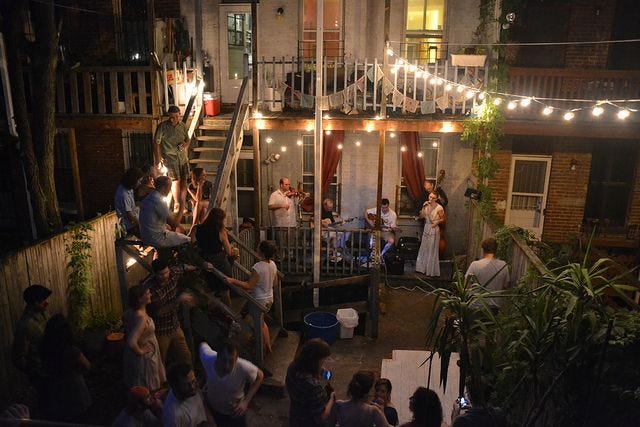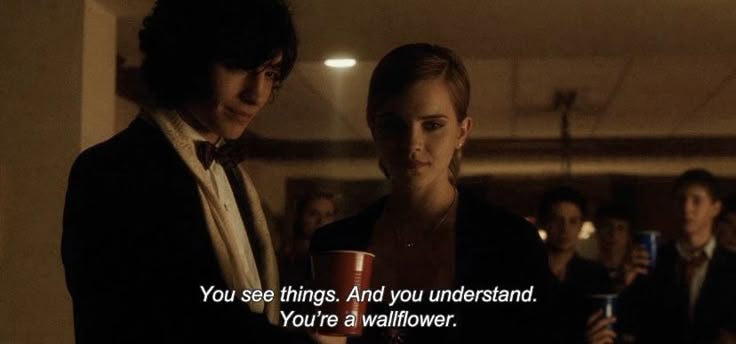you're so brave for being here
a case for bravery: bringing strangers back into your life and reclaiming agency
Not too long ago, I spent some time at a dinner party, twenty or so of us resting our backs against countertops, leaning in to catch stray words over a constant stream of music. Frequent hellos and tepid introductory hugs throughout the night are the typical signs of a mixed crowd. The sort of crowd I’ve grown accustomed to.
Having lived here and there, dropping in and out of lives, there are always more people when you leave and somehow fewer when you return. I’m good at the hi’s and the byes. I don’t think twice about it. God knows I used to, but I hadn’t had to for a while, not until this night. Or perhaps more accurately, until a certain point in the conversations I found myself having over and over.
Each time I confessed that the only person I knew there was the host, it felt like a revelation. One met with varying reactions, all saying essentially the same thing: You’re so brave for coming!
In situations like this, I often wonder what came first: Did my fondness for writing sharpen my sensitivity to word choice, or did my pedantic insistence on precision shape my writing? It’s a trivial thought experiment. Either way, I end up here: picking apart compliments, analysing them as symptoms of a situation rather than simply basking in the attention—especially when they don’t resonate.
What I’ve come to like about words, adjectives specifically, is that your ability to embody them is entirely dependent on the person who assigned them. In many cases, the words they choose for you say more about themselves than they do about you. Bravery is one of those things. It’s almost always subjective and often misplaced.
In the moment, there’s not much you can do but smile and say, “Oh really?”. It wasn’t until the next day, when I was mulling over a couple interactions, that I could dissect why the word brave stood out to me. To put it simply, I feel the same way about this as I do when someone holds me in high regard for not drinking. It feels like spontaneous praise and approval for having done very little. It’s praise nonetheless, and by no means is it a bad thing. But in typical Onyi fashion, I feel compelled to pick apart the perception of bravery here. What is it about choosing to be in a room full of strangers that unsettles us?
we’re losing recipes
It’s no secret that our generation has become accustomed to isolation, self-inflicted or otherwise. The world has never been more accessible, and yet we seem siloed into communities with limited intersections both online and in real life. It’s a criticism that has been lobbied against us for a lot of different reasons, some true, others often cruel, especially when the path imposed on us to get here is ignored. You’ve heard it before: an overdependence on technology, a necessary but impactful lockdown, the decimation of third places and the mental burden of current political climates, to name a few. Often, I feel that having lived through it, and often discussing it, we minimise the origins of our problems. However, the redundancy of a fact does not and will not reduce its impact on us.
Nevertheless, this is the state affairs. But what concerns me more is that rather than acknowledging and addressing it, some of us run straight to weaponising the explanation for our cautious behaviour as an excuse. It wasn’t long ago that an attitude of “we don’t owe each other anything” swept through our for-you pages like a flood, leaving behind fragmented and often skewed think pieces in its wake. Don’t get me started on the question of whether or not service workers ‘owe’ you a smile at the counter.
Beyond these online arguments, I often think, “So where do we go from here?” cause I can’t be stuck in this mentality. The world is such that it is begging us to be a community. There are too many people in the world, let alone your borough or postcode, for you to think you’ve met everyone you’ll ever know deeply. I think about my parents who get recognised on the street, at the airport, and abroad multiple times a month. Some of these friends are connected, and some aren’t, and it’s because my parents have lived a life in which they didn’t shy away from connection, no matter how involved or otherwise. Even I, a walking imitation of their younger selves, have been stopped by people who used to know them or still do. There’s always a story of how and why they met. Sometimes, it was years ago, and sometimes, it was just last year. I aspire to live a life like that. To know and be known. Their reality seems to be one of connection and openness.
But how do you do that when we all seem to be languishing in a state of seclusion, one that has left us no longer wanting ‘purposeless’ connections unless there’s a result or reward attached to them? The simple answer is to take your agency back. Yes, we live under certain conditions, but as a child must take its first step or young adults untangle their destiny from their parents’ dreams, we too must decide to thrive despite our circumstances and not because of them. Even if this means going to that place, movie, or show yourself instead of waiting for that one person who never responds on time, you owe it to yourself to fulfil your whims (within reason).
Even now, I think of how many strangers we would have to interact with if we removed certain luxuries. If you couldn’t stream your favourite show at home, we’d all be huddled, perhaps vying for a seat at the local cinema the rare time they had it on. The reliance on instant gratification, automation, or comfort has us so used to our immediate circle that behaving otherwise can feel like exposure therapy to some.
“you’re so brave…”
This, of course, leads me back to the idea of bravery because the purpose of exposure therapy is to conquer fear. Where there is fear, there’s a perceived danger.
In discussions with others on this topic, the conclusion always seems to be that the primary fear is that of being uncomfortable. I agree; it’s entirely plausible and often the fear behind many of our avoidant tendencies, but I’m inclined to displace it as the ruling reason.
It may be time to give our fear of rejection some time in the sun. Intentionally positioning yourself amongst strangers often feels like being caught without your defences. You’re without the people who feel like family, with whom no effort is required. It’s uncomfortable, yes, and it often, at least in my experience, drives us to seek ‘our person’ in the crowd. The person who can validate those feelings of apprehension. I think the fear is not just in being uncomfortable but in putting yourself out there hoping that the person or people you’ve identified with recognise the same in you, knowing they may not. That rejection, if it comes, would inevitably amplify any feelings of discomfort you arrived with.
Unfortunately, in my short life, I’ve found rejection to be unavoidable. It often rears its ugly head in situations it probably isn’t called for. A hopeful connection you made with someone fizzling out can feel that way, even if it seemed successful at first. The only salve I’ve found for this is to expose yourself to more of it and thus unravel your sense of identity from every no or maybe the next time you receive it. Because if the connection is what we need, surely we owe it to ourselves to risk being seen. A fun side effect of engaging in more expressive—and often vulnerable—experiences, like attending talks, movies, parties, or clubs alone, is the quiet deflation of the ego. It’s a humbling and difficult process, one that helps reevaluate our sense of self-importance and allows us to respect others’ boundaries and preferences, especially when they don’t automatically click with us.
It’s often said that the best way to learn more about yourself is with others. But if you only surround yourself with the same people, that education can stall quickly. So I will endeavour to continue being ‘brave’ - not just for the sake of it, but in hopes of cultivating a flourishing ecosystem. And I hope you afford yourself the same opportunity!
Hey guys, hoped you enjoyed this week’s essay!
Don’t forget my new Substack video series, “What My Brain Eats”, comes out on Saturdays! This week’s guest is
. We’re going to discuss the media she consumes recently to combat brain rot. Naturally, we also got into some discussions about getting to the bottom of history, religion, convenience and cultural influences. I’ll be sending you guys the trailer for this episode in the next 24 hours, so make sure to check the chat. If you want to catch up on last week’s episode with Philomena Marie, here ya go: (Spotify link)As per usual, you can find me on TikTok, Instagram (daily media recommendations) and Arca (curated recommendations) .








